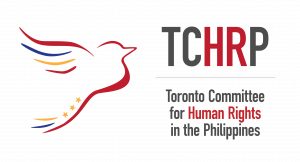Human Rights – A Common Struggle at Home and Abroad!
Human Rights – A Common Struggle at Home and Abroad!
 Toronto Committee for Human Rights in the Philippines statement:
Toronto Committee for Human Rights in the Philippines statement:
The past month in Canada and the USA has seen repeated violations of human rights by the authorities, most especially the human rights of Black and Indigenous Peoples.
In the United States, the recent killings of Ahmaud Arbery, Breonna Taylor, Tony McDade, George Floyd (whose killer had previously killed Indigenous man Wayne Reyes), among many others, have reignited the smouldering resentment felt by oppressed peoples toward their constant and ongoing mistreatment and violence at the hands of police.
In Canada, recent police shootings have killed Eishia Hudson, Jason Collins, and Stewart Kevin Andrews, all Indigenous People shot by Winnipeg police in the span of one week. A Black man, D’Andre Campbell, was shot by police in Peel region. An unnamed man in Temiskaming on April 9, an unnamed man in
Scarborough on April 15 (who was tasered, shot with a “less-lethal” shotgun, and then shot with a pistol), and an unnamed man in North York April 30, were all killed by Ontario police. These are only the most recent police shootings since the COVID-19 shutdowns.
Regis Korchinski-Paquet’s family has demanded answers in light of the many deaths of Black people after the police were called to assist them.
On May 27th, 2020, Regis Korchinski-Paquet, a Black woman, died in her Toronto apartment while she was alone with the Toronto police. Her mother had originally called the police for help during a personal crisis. Her family has demanded answers in light of the many deaths of Black people after the police were called to assist them.
In the early morning of May 29th, the largely Black community in the Jane & Sheppard neighbourhood was terrorized by armed police officers engaged in a pre-dawn paramilitary raid.
All of these actions have occurred during the middle of the COVID-19 pandemic, which in North America has disproportionately killed Black and Indigenous Peoples.
Parallels and Solidarity
The Toronto Committee for Human Rights in the Philippines (TCHRP) is dedicated to monitoring and decrying human rights abuses in the Philippines. So why are we making a statement about police killings in the United States and Canada?
We see many parallels between the violations of human rights by the governments of the USA and Canada, and those by the Government of the Republic of the Philippines. In drawing attention to these parallels, we can help to demonstrate a basis for solidarity between the many peoples of the Philippines and oppressed peoples in North America.
In the Philippines, Duterte tells the military and police to shoot people who violate quarantine. In America, Donald Trump tweets that “when the looting starts, the shooting starts”. Obama labeled Black people rebelling against the killing of Freddie Gray “criminals and thugs.” Canada’s Trudeau is much smoother – in response to blockades defending Indigenous land rights, he said “…it has been two weeks and the barricades need to come down now.” In Canada armed police invade Indigenous lands and Black neighbourhoods and politicians wash their hands and say it’s only a police matter.
In the Philippines, the underdevelopment caused by semi-colonial, semi-feudal conditions has led to a vast diaspora of Filipinos under the labour export policy. In Canada, they are dying disproportionately of COVID-19. In Canada and the USA, the colonial conditions of Black and Indigenous people have created directly comparable systems of extreme poverty and unemployment, lack of access to clean water and housing, and intense repression in the form of government policy and police violence.
We cannot call for human rights in the Philippines without calling for human rights in Canada and the USA.
We cannot call for human rights in the Philippines without calling for human rights in Canada and the USA. Both Canada and the USA violate human rights in the Philippines, whether through mining and logging companies that violate the rights of peasants and Indigenous People, or through arms sales that fuel the civil war and “anti-terror” actions, or through entangling the Philippines in large geo-political conflicts through the EDCA and VFA.
Both countries engage in the same violations of human rights violations at home, from colonial projects like pipelines in Standing Rock or Wet’suwet’en, to police killings of poor, Black, and Indigenous Peoples. Both countries, like the Philippines, “red-tag” activists and oppressed people in order to expose them to judicial and extra-judicial violence.
The Right to Live in Peace
In Canada, the diaspora of Filipino workers also become targets of racist policing. In 2004, 17-year old Jeffrey Reodica was killed by a plainclothes Toronto police officer. Community Alliance for Social Justice (CASJ) worked with the Justice for Jeffrey Coalition. They said in their 2005 statement on the anniversary of Jeffrey’s shooting that his death must be understood in context, as “one among many in Canadian society that point to the issues of racial discrimination, police brutality and police impunity.”
A common thread links those searching for justice in communities terrorized by police brutality from Toronto to Minneapolis to the Philippines. In all countries, oppressed people struggle to live dignified lives. These struggles have their particular causes and expressions, based on the particular experiences and histories of different peoples and places. But they also have general causes and expressions. Among them is the demand for the right of people to live in peace, without fear of unaccountable police violence or the violence of racist power structures.
CASJ promised in that 2005 statement, and we will echo: We will not rest and we cannot have real peace until justice is done.
Comments (0)